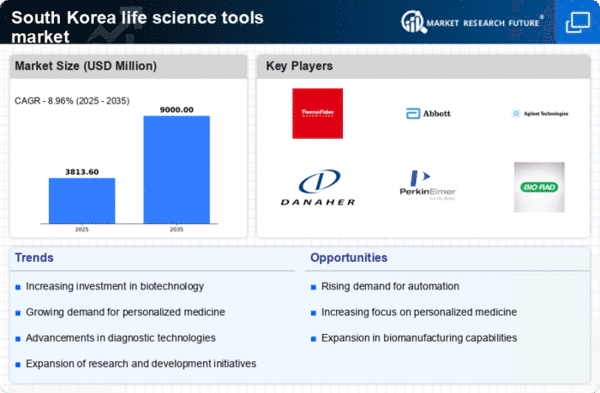Emergence of Biopharmaceuticals
The biopharmaceutical sector in South Korea is rapidly expanding, which is having a profound impact on the life science-tools market. As the country positions itself as a leader in biopharmaceutical development, the demand for specialized tools and technologies is likely to increase. This includes a variety of instruments used in drug discovery, development, and manufacturing processes. The biopharmaceutical market is projected to reach $10 billion by 2027, which will consequently drive the need for advanced life science tools. This growth presents opportunities for manufacturers to innovate and cater to the specific needs of this burgeoning sector.
Increased Focus on Quality Control
Quality control is becoming increasingly vital in the life science-tools market, particularly in South Korea. As regulatory standards tighten, laboratories are compelled to adopt more sophisticated tools to ensure compliance and accuracy in their processes. This shift is likely to result in a surge in demand for analytical instruments and quality assurance solutions. The market for quality control tools is projected to grow by approximately 10% over the next few years, reflecting the heightened awareness of reliability in research outcomes. Consequently, this focus on quality is expected to significantly influence the life science-tools market.
Government Support for Life Sciences
Government initiatives in South Korea are playing a crucial role in fostering the life science-tools market. With substantial funding allocated to research and development, the government aims to enhance the country's position in the global life sciences sector. Recent policies have focused on promoting innovation and collaboration between academia and industry, which is expected to stimulate market growth. For instance, the government has committed over $500 million to support biotechnology research, which directly impacts the demand for life science tools. This supportive environment is likely to encourage the development and adoption of advanced tools, further driving the market.
Rising Demand for Advanced Research Tools
The life science-tools market in South Korea is experiencing a notable increase in demand for advanced research tools. This trend is driven by the growing emphasis on precision and efficiency in scientific research. Institutions and laboratories are seeking innovative solutions that enhance their capabilities, leading to a projected market growth of approximately 8% annually. The need for high-quality instruments, such as next-generation sequencing systems and high-throughput screening technologies, is becoming more pronounced. As research institutions strive to maintain competitiveness, investments in cutting-edge tools are likely to rise, thereby propelling the life science-tools market forward.
Integration of Artificial Intelligence in Research
The integration of artificial intelligence (AI) into research methodologies is transforming the landscape of the life science-tools market in South Korea. AI technologies are being utilized to enhance data analysis, streamline workflows, and improve the accuracy of research outcomes. This trend is likely to lead to the development of new tools that incorporate AI capabilities, thereby increasing efficiency in laboratories. As organizations recognize the potential of AI to revolutionize research processes, investments in AI-driven life science tools are expected to rise. This shift could potentially reshape the market dynamics, fostering innovation and growth.
















